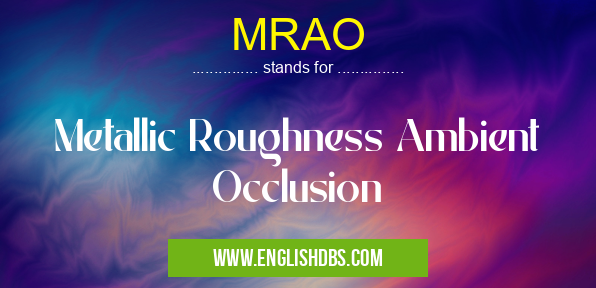What does MRAO mean in UNCLASSIFIED
MRAO stands for Metallic Roughness Ambient Occlusion. This abbreviation is used in 3D computer graphics and helps render realistic images of any object. It is a rendering workflow that allows computer artists to simulate the physical properties of real-world materials as accurately as possible. MRAO works by combining three different textures together, which can be mixed and modified for various results. These textures include Metallicity, Roughness, and Ambient Occlusion. This combination creates convincing visuals of surfaces on objects, allowing users to create realistic models of any scene imaginable.

MRAO meaning in Unclassified in Miscellaneous
MRAO mostly used in an acronym Unclassified in Category Miscellaneous that means Metallic Roughness Ambient Occlusion
Shorthand: MRAO,
Full Form: Metallic Roughness Ambient Occlusion
For more information of "Metallic Roughness Ambient Occlusion", see the section below.
Metallicity
Metallic textures are used to determine how much light will reflect off an object’s surface and how that light will interact with nearby objects or surfaces. This texture controls the brightness of the highlights and shadows along the surface as well as how reflective it looks under certain lighting conditions.
Roughness
Roughness texture determines how rough or smooth a surface appears when light interacts with it. It affects things such as glossiness, reflections, shadows and highlights on the object’s surface making it look more or less detailed than it would if these effects were not included in the rendering process.
Ambient Occlusion
Ambient occlusion texture defines areas where direct light does not reach due to obstructions in its path such as other objects or walls blocking out its rays. This results in dark shadowed “crevices” appearing around these obstruction points which can add dimensionality to a model if applied correctly.
Essential Questions and Answers on Metallic Roughness Ambient Occlusion in "MISCELLANEOUS»UNFILED"
MRAO is a very important part of 3D computer graphics workflow and helps create realistic models from any angle imaginable by taking advantage of different textures such as Metallic Roughness Ambient Occlusion. With this combination, computer artists can simulate physical properties of real world materials with accuracy while creating believable visuals from any scene they imagine!
